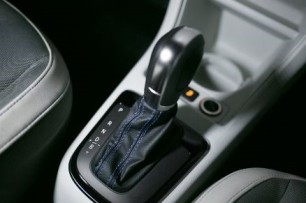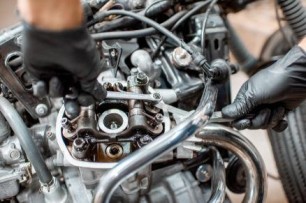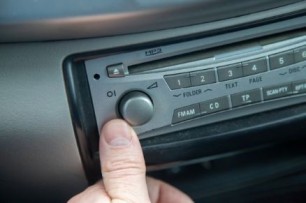General Insurance Blogs, Articles & Updates by - Magma HDI
Have us call you
- RENEW YOUR POLICY
- BUY NEW POLICY

How to maintain a clean riding record, and how does it impact your two wheeler insurance
For every two-wheeler owner, it is imperative to know various driving and traffic rules and regulations that prevail in the country. One of the most important rules of riding a two-wheeler here is the mandate of having 2 wheeler insurance. However, just having two-wheeler insurance is not enough. You also need to maintain a clean riding record. Your insurance will not be affected when you have a clean riding record.
This article is for you if you are unaware of a clean riding record and how it impacts your insurance.
What is a clean riding record?
A clean riding record, in simple words, looks at all aspects of your two-wheeler. It considers how you drive, the accidents you've encountered, broken rules or any challans you received, and so on.
It provides the whole history of your two-wheeler. The official statement includes all the details of your vehicle and directly affects your 2 wheeler insurance as well. When your insurance premium is calculated, the accidents, traffic violations, and challans are considered part of your riding record.
How does it affect your two wheeler insurance?
Many factors are taken into account while calculating your 2 wheeler insurance. These are:
● History of claim
● Model of vehicle
● Location of your vehicle
● Riding record
● Type of Plan
● Year of two-wheeler manufacturing
Riders with a clean record will likely be blessed with the best insurance plans and discounted premiums. This may not be the case for others.
Factors affecting riding record.
1. Late payment of challans:
This directly shows your laid-back attitude and procrastination. It is advised not to violate traffic rules and get a challan. If you do, you should try to pay the fees for the same on time.
2. Accidents:
This is the most dangerous thing to affect your riding record. Your negligence or carelessness during driving can cause accidents and reflect badly on your profile.
3. Violation of traffic rules:
If you violate any traffic rules, it will reflect significantly on your riding record. It can involve over-speeding, overtaking, jumping traffic signals, etc. It is recommended to follow all traffic rules to eliminate the risks of accidents.
4. Intoxication:
If you've been caught riding your two-wheeler while drunk or under the influence of other intoxicants, your riding record can be tainted forever. It is advisable to avoid drinking and driving to remain safe on the roads.
How to maintain a good riding record?
You must maintain a clean riding record to claim your 2 wheeler insurance without any hassles. The steps are
1. Ride safely:
You must be responsible on the road and avoid riding recklessly. You should be respectful of everyone on the road and keep them safe.
2. Follow traffic rules:
It is advisable to follow all the traffic rules and regulations without fail. You should not over-speed or jump traffic lights. Avoid parking your vehicle in no-parking zones.
3. Pay penalties:
If you break any traffic rule by mistake and receive a challan in your name, immediately pay the fees. Do not wait till the last day.
Being safe on the road and maintaining a clean driving record is always advisable to avoid any mess up with your insurance claims. Make a smart move, follow the aforementioned steps, and reward yourself with a clean riding record and the seamless benefits of 2 wheeler insurance.
Click HERE to buy comprehensive 2 wheeler insurance.
Disclaimer: The information provided above is for illustrative purposes only. To get more details, please refer to policy wordings and prospectus before purchasing a policy.

Here are a few car gearbox problems and the ways to resolve them
Having a car helps you manage your personal and professional lives with convenience and independence. While the whole process of purchasing a vehicle can be pretty extensive, it is equally important to take care of your vehicle to maintain its efficiency. Hence, it would be best to get it serviced regularly. Ensure that all the damages are repaired and replaced according to need.
But how do you ensure that your car stays up and running? There are several parts that require regular inspection. One of them is the gearbox. How can you detect and rectify problems with your gearbox? What happens if you don't get them checked by an expert?
This blog will discuss significant pointers about problems and the ways to resolve them.
1. Unexpected noise:
If you feel that your car is shaking, moving roughly, jerking or making grinding noises while operating, this indicates some underlying problem. And if you notice these noises when you shift the gear, it is an issue with the gearbox.
2. Laggy acceleration:
If you notice a slight delay (more than a second) in your vehicle's acceleration while you shift gears, this could suggest a problem with the gearbox. It could also be due to a faulty clutch part that finds it challenging to engage and disengage completely. Get this issue examined by an expert car mechanic to ensure proper repair and maintenance of the gearbox before the situation worsens.
3. Gear slipping:
The gearbox heavily depends on your actions and how you operate it unless it is automatic. Gear slipping is a phenomenon in which the car jerks and the gear shifts back when you accelerate. There are possibilities that it might change into neutral at times. And jumping to neutral gear while in motion can be risky and invite accidents as your car will halt suddenly.
4. Spilling of fuel:
The gearbox of your car is a crucial mechanical component. Since it moves in a rotational pattern, it needs fuel for lubrication. It is likely a transmission fluid leak if you detect bright orange-coloured liquid drops under your car. Get it fixed to avoid the gear from drying out.
5. Smell:
Overheating of the transmission fluid can cause improper gear shifts and a burning smell. Transmission fluid is essential in reducing the heat and cooling down the gearbox components.
Now that we have listed specific gearbox problems to look out for, the next question is how to resolve them. You can monitor the transmission fluid periodically, keep a check on the gears, make sure that the cooling system works efficiently, get your car serviced at regular intervals, drive with care and watch out for the signs we discussed above.
Another way to ensure that your car stays in good shape is to get it insured against unprecedented damages. You can safeguard your vehicle by purchasing the best car insurance in India and be relieved from the monetary stress involved in car maintenance and repair.
Click HERE to know more about how you can buy the best car insurance in India.
Disclaimer: The information provided above is for illustrative purposes only. To get more details, please refer to policy wordings and prospectus before purchasing a policy.

Here’s the guide to enjoying a perfect group trip
Group trips are often a sort of once-in-a-lifetime opportunity for everyone. However, it is tough to set an itinerary that is convenient for all and pleases each one in the group. Differences may arise when choosing the mode of travel. Some may want to take a flight, some train, while others want a road trip. Further differences may arise with the choice of hotels, destinations covered, trip duration, etc. What to do now? Fret not!
We are here with our exclusive guide to enjoying a perfect group trip.
1. A group leader:
The first step for the success of any group trip is to appoint a group leader. He should be bold, knowledgeable, a good researcher, and a planner. He should also be a good team player as he will have to manage and deal with everyone in the group.
The appointment of a group leader will ensure a single point of contact for addressing the needs of all. He can finalise the travel dates, mode of travel, hotels, etc., after discussion with everyone in the group on a one-to-one basis.
2. Budget:
A group trip is about convenience for one and all. Some may want an international holiday, while others want to go within the country. Some may favour travelling by air and staying in a five-star hotel, while others may want to make it more budget-friendly, travel by train, and stay in less expensive hotels.
The group members should first decide on their budget and book accordingly. The trip should not put undue pressure on anyone financially and cause inconvenience.
3. Book in time:
A group trip involves a lot of bookings, be it for travel, accommodation, or sightseeing. Always make your bookings as soon as possible otherwise you will have to pay steep prices for your flight and hotel booking. There is also a chance that tickets or rooms become booked and unavailable for your travel dates. A delay in bookings can spoil your entire travel plan.
4. Plan beforehand:
A perfect group trip means planning possibly everything before you arrive at your destination. Local sightseeing and related bookings should be planned to avoid confusion and delays later. For example, you may consider booking cable cars in advance if you visit such a destination in a large group. Buying cable car tickets on the spot can take a lot of time. Also, there is a chance that there are no vacant seats left for you at the last moment.
You should also plan your meals well in advance. Everyone has a different food choice, and meeting their expectations can be daunting. Find good restaurants for meals, declare the menu/ available choices in advance and book them accordingly.
5. Do not make your trip hectic:
A perfect group trip will give everyone some personal space and time. Never make your travel itinerary very hectic and time-bound. Keep a comfortable gap between various activities so that people are not left exhausted at the end of the day.
You can also plan to keep an extra day in hand so that individuals can use their holiday time as they wish and do the activities of their choice. Remember that you are on holiday, not on a mission, to finish some tasks.
No trip can be as enjoyable as a group trip with family or friends. But it has to be planned well in advance and executed effectively. Similarly, you need to plan for your general insurance needs well in advance so that it provides adequate security coverage in times of emergencies. As there are several general insurance companies in India, always thoroughly research their policies and coverage and opt for the best one.
Click HERE to buy insurance from the reliable general insurance plan to make your group travel safe from mishaps.
Disclaimer: The information provided above is for illustrative purposes only. To get more details, please refer to policy wordings and prospectus before purchasing a policy.

Five reasons every salesperson needs a personal accident insurance
A salesperson is always on the go, meeting new people and constantly travelling from place to place. They are an integral part of any company. The company's reach to the broader masses depends on a salesperson's ability to promote the products and services of the company and make people aware of all the benefits of indulging in it.
But having said that, a salesperson is susceptible to situations during work that an otherwise office employee wouldn't face. Therefore, this article will shed light on why salespersons need personal accident insurance in India and how it will safeguard the company and the individual from any expenses that might occur in the future.
1. Claiming any disability:
A salesperson's job translates to tight deadlines and busy schedules, and sometimes to meet the deadlines, they need to rush, which can lead to dangerous accidents during work or otherwise. Hence having personal accident insurance in India can assure the safety of a salesperson in many ways. Any disability caused during the accident can be claimed, and the person will be compensated appropriately.
Sometimes an accident might lead to a permanent loss of income. Under such situations, the insurance provider mitigates the financial losses caused.
2. Hospital expenses:
With medical bills skyrocketing, not having insurance is not an option. Starting from ambulance charges to the medical expenses, including but not limited to medicines, tests and scans are covered under this policy. The insurance provider compensates for all the policyholder's medications during and after the treatment. This takes the pressure off the shoulders of the insured.
3. Environment modification:
In case of an accident, certain changes will need to be made at home and work. People who use wheelchairs or other kinds of support will need to make modifications to their house and vehicle. Setting up a ramp, modifying the bathroom, making the car wheelchair friendly are just a few modifications that one will need. Insurance providers will be able to provide compensation for these modifications as well.
4. Transportation cost:
Finding the best treatment in the closest hospital is not always possible. In such a case, the insurance provider will reimburse all expenses incurred by a family member for the commute between the hospital and home. The transportation cost for the ambulance is also covered under this policy.
5. Accidental death:
Upon the death of the policy bearer, the insurance provider pays the entire sum of insurance to the nominee. Additionally, an educational grant is provided for the education of two dependent kids up to the age of 23. The insurance provider also covers the funeral cost and the transport of the mortal remains.
These are a few reasons why salespeople should invest in personal accident insurance in India. Many people believe that health insurance and accident insurance are the same. However, accident insurance solely caters to losses or expenses due to an accident. Therefore, one must get accident insurance to safeguard their future.
Click HERE to find out about personal insurance India.
Disclaimer: The information provided above is for illustrative purposes only. To get more details, please refer to policy wordings and prospectus before purchasing a policy.

Here are a few tips to change your bike's engine oil
No experience in life can compare to the adrenaline rush of riding a motorcycle. However, it is crucial to note the importance of maintaining your two-wheeler. Regularly changing the engine oil in your bike's motor is a vital part of keeping it functioning and operating smoothly. Without frequent oil changes, it overheats, the friction between its internal components increases, and overall performance suffers. As a bike owner, you must ensure that your bike's oil is changed regularly.
Yet another way to keep your bike safe is to cover it against any unexpected incident, such as damage, robbery, loss, or natural calamities, with the help of ideal 2 wheeler insurance.
Here are some important steps to change a bike's engine oil.
1. Start your engine:
It's a lot simpler to replace your oil while your engine is warm, so make sure you run it for at least 30 minutes before starting to change the oil. Remember, do not start a motorcycle and leave it idle. You will face the risk of causing damage to your bike.
2. Removal of old oil:
The next step is to dispose of the leftover oil by gently emptying it into a drain pan. The pipes from which the motorcycle oil is to be unloaded are positioned differently on various models, so be sure about the correct pipe before you begin.
Bend the motorcycle at a 45-degree angle and maintain it there for a few minutes. With a wrench, release the drain bolt and allow the oil to drain. Don't stop until you are confident there is no more oil left inside.
3. Install a new oil filter:
Be cautious while removing the old oil filter since there may be some spills. Before changing it, apply a little fresh oil to the new filter. This will guarantee that it runs smoothly into the engine and is readily withdrawn during the new oil filter replacement. Screw-in the fresh oil filter by hand, and be careful not to over tighten it.
4. Fill in the fresh motor oil:
Using the repair instructions manual that comes with your bike, measure out the exact quantity of oil required in a beaker. Remove the engine oil valve nut and insert a funnel to help the oil flow. Then, add the carefully measured oil to the engine.
Start the engine without revving it and let the fresh oil flow. With the completion of this step, you have successfully finished the procedure of changing the engine oil of your bike.
5. Finishing adjustments:
There are still some things remaining after the procedure. Ensure that there are no leaks and double-check all the bolts to assure they are snug. Wipe off any residual oil from the bike's surface using a cloth.
Bike owners have a close affection for their two-wheelers. As a result, they are not hesitant to get their hands dirty if it means keeping their bike in top condition. While an oil change ensures more remarkable performance, it does not protect from external causes or physical damages. Hence, responsible bike owners must invest in 2 wheeler insurance for the assured safety of their bike and good financial coverage if they incur loss due to accident or theft.
Click HERE to buy two-wheeler insurance.
Disclaimer: The information provided above is for illustrative purposes only. To get more details, please refer to policy wordings and prospectus before purchasing a policy.

Here are a few tips for installing an audio system in your car
We all love good music, especially while driving around or travelling long distances. The music system has become an essential factor associated with the purchase of cars. Vehicles today come with fancy sound systems, and their features differ with the price range and models.
The sound system has evolved massively over time. The type of speakers, the sound they produce, and different settings are now being provided in all kinds of cars. The modern intelligent and hands-free voice-enabled audio systems have raised car owners' bar.
In this blog, we will discuss the audio setup for your vehicle and a few tips for installing an audio system.
1. Stereo:
You need to figure out the stereo you are looking for. List all your expectations from the one you want to install. It could include multiple features like touchscreen, playback (video), navigation, etc. You can purchase a stereo (aftermarket) and get it installed by an expert technician to ensure that the wires are not altered, and the warranty doesn’t void.
2. Speaker:
Your current speakers might lack treble bass and dull the vocals. You can resolve this issue by getting a new speaker according to your needs. There are component speakers with two-way or three-way components.
The two-way speakers produce mid-low bass and vocals frequencies, while the three-way component speakers have an additional speaker for middle-range frequencies. You can also pick the full-range speakers, mainly known as the co-axial speakers, for an immersive audio experience.
3. Amplifier:
To achieve loudness from your speakers, you can add an amplifier to your audio system. It comes in various configurations and power outputs. Some of these configurations are 4/3/2 channels which consist of four-channel amplifiers: these amplifiers power one subwoofer or one subwoofer and two speakers or four speakers. You need to get a component subwoofer if you like loud, thumping bass or sub-bass in the songs.
4. Subwoofer:
The customisable option amongst subwoofers is the component subwoofer. It has a wide range of power ratings and sizes options. Bass tube and bass box subwoofers are preinstalled in tube type and bass box type enclosures. You can directly use them to plug and play.
Another option in this category is the under-seat subwoofer. They focus on bass and space utility as they can be easily installed under your seats, thus freeing up the boot space of your vehicle.
You can use some damping sheets on the doors, windows, floors of your car to lessen the background noise from the roads and reduce the vibration from the doors due to loud volumes. This would amplify the impact of the music.
That’s a wrap on the tips to install an audio system in your car. Adding to this, it would be wise if you refrain from listening to loud music while driving. It may distract you, and an unstable focus on the road can lead to severe mishaps. Along with installing an audio system, consider getting your car insured to safeguard it against damages and stay stress-free monetarily. Invest in suitable private car insurance India and ensure the longevity of your vehicle.
Click HERE to know more about buying private car insurance India.
Disclaimer: The information provided above is for illustrative purposes only. To get more details, please refer to policy wordings and prospectus before purchasing a policy.

Five ways to help your child choose the right career
As a parent, the responsibility to help your child choose the right career can be challenging. In the past, Indian society has noticed parents putting their children under tremendous pressure by comparing them to other children.
Nevertheless, parents have become aware of the importance of helping their children pick the right career. When your child passes out from high school, the next step is to decide which career will be best for them. We have got you covered!
In this blog, we will discuss five ways to help your child choose the right career for them.
1. Always treat your child as an individual rather than forcing your choices on them:
Even though your child came through you, they may not hold the same likes and dislikes as you. Unfortunately, many parents do not understand their child's likes and dislikes and want them to pursue careers that they couldn't when they were young.
However, doing so can affect your child's mental health and mislead them in the wrong direction. Instead, try to understand their views without belittling them. Their dreams and aspirations should be your priority.
2. Help them find their interests:
Some children may have a firm decision about the career they want, while others may be confused. Encourage your child to find what interests them. You can list down all the things they like and dislike. You may also motivate them to analyse their strengths and passions.
3. Get professional help for your child:
Sometimes, picking the right career can become challenging due to a lack of understanding between the child and parent. Therefore, provide professional help to your child by connecting them to counsellors who can conduct their aptitude test and guide them about which field interests them and what career prospects can be the best for them.
4. Help them explore all the options:
As a parent, you will be aware of your child's hobbies, dislikes, and likes. For example, if your child is already excelling in painting, you may encourage them to explore their options. Help your child explore all the possible career options that let them enjoy their passion. Remember not to go too far, as it can be overwhelming for them. Figure out the right time to discuss it with your child and slowly approach the conversation.
5. Be encouraging and patient during the process:
Choosing the right profession does not happen overnight. Humans evolve with time. Remind your child that it is alright to take their time to explore their interests.
If your child wants a break for their self-discovery journey, do not demotivate them. Instead, encourage them to keep exploring their options and pick the ones they like.
When helping your child pick the right career option for them, you need to have a lot of patience and strength. This process and such a wide array of options can be overwhelming and frustrating for your child, which can cause them to become anxious. However, you can support your child by encouraging them to take their time to figure out their options.
Help your child pick the right career without putting them under pressure or treating them as an extension of you. A secure future is also essential for your child. Invest in general insurance and shield your child's aspirations and health, all under one comprehensive cover. Look for online general insurance to get multiple options and benefits.
Click HERE to get online general insurance for your child to ensure their well-being and safety.
Disclaimer: The information provided above is for illustrative purposes only. To get more details, please refer to policy wordings and prospectus before purchasing a policy.

How early immunisation can help your infant have a healthy life
For more than five decades now, immunisation has saved billions of lives. It's a low-cost, high-impact strategy to safeguard your child's health against various diseases and infections. Immunisation builds the groundwork for a healthy future.
Vaccines are critical in protecting the most vulnerable, such as children and infants. However, one out of every five children in the world is still unvaccinated. Having the highest number of unvaccinated children, India has strengthened its efforts to enhance mass vaccine coverage with mission Indradanush 2.0.
Over the last few decades, healthcare has become increasingly expensive. A health insurance policy can come in handy during costly treatments and hospitalisations. So, look for online health insurance companies to buy a policy to secure your child's future and cover them under seamless benefits. To find out more about immunisation, continue reading this article.
What is immunisation?
Immunisation is the process that protects people against illness caused by microorganism infection (formally called pathogens) by increasing the immunity of the body to combat these infections. A vaccine is a biological substance used for immunisation.
How does immunisation work?
When immunised against a disease, your body treats it as a natural infection. A vaccine contains a microorganism that is introduced into the body in a dead or weakened form. However, your immune system has no way of knowing whether the virus is alive or dead, so it takes it as a red alert and treats it as a threat. As a result, the immune system produces antibodies to attack the virus and eliminate it from the body.
As a result, if you acquire a similar virus in the future, your immunity will be prepared to combat that virus and shield your body against its infection. According to a World Health Organization report, immunisation saves an estimated 2-3 million lives each year (majorly children) by protecting against diphtheria, pneumonia, pertussis (whooping cough), rotavirus, diarrhoea, rubella tetanus, smallpox, polio, mumps, and measles.
Immunisation has eradicated many terrible diseases that massacred people in clusters and tons. Despite this, an estimated 19.5 million infants have not received all immunisations. The need to adequately communicate the health advantages of vaccination and the risks of not immunising children cannot be overstated.
Importance of early immunisation:
Most health experts, researchers, and professional medical organisations strongly recommend immunisation. Vaccines are the most effective steps to prevent infectious diseases.
Vaccine-preventable diseases are known to induce childhood stunting, leading to poor growth, poor adult health, and lower learning ability in children. But, getting your infant vaccinated at the right time can prevent them from having to experience such situations.
Vaccinations are an essential factor in determining your children's health. Shots for children are only effective if they are given on time and according to schedule. They aid in developing children's immune systems, allowing them to grow up healthy and happy. The development of cognitive abilities is also observed after vaccination.
Alongside vaccination, it is essential to buy comprehensive health insurance for your child to secure their health and life further. You may look for online health insurance companies and browse through different plans, compare their premium, and then choose the one that fits all your requirements.
Click HERE to know more about health insurance.
Disclaimer: The information provided above is for illustrative purposes only. To get more details, please refer to policy wordings and prospectus before purchasing a policy.


